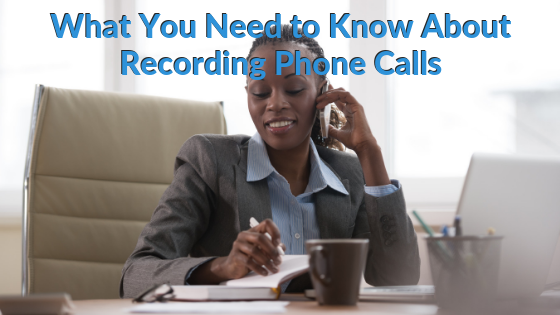
When it comes time to do business, there’s a real added benefit to recording live phone calls. Recorded calls can be great for training new employees and giving you better insights into your customers’ needs. Of course, you also need to make sure you know what laws could affect your ability to record and store those phone calls.
So let’s make sure you (or your business) is ready to start recording calls while obeying applicable laws.

Recording Phone Calls Requires Notification
Now, in order to comply with federal and state laws, you need to know what those are. At the most basic level, the Federal government requires that at least one party in a phone conversation is aware that the call is being recorded.
In most states, you (or your business) counts as that one informed party. So if your business is in a single-party consent state, then you can start recording phone calls legally.
However, there are 11 states that have passed “two-party consent” laws. That means that if you want to record a phone call, both you and the other person on the line must be aware that the call is being recorded.
That’s why so many customer service lines have that line at the beginning: “This call is being monitored and recorded for training purposes.” It’s a way to inform both parties that the business is recording the call – and it’s then legal for them to do so.
When Recording a Phone Call is Illegal
Now, there are a few times when recording a phone call is illegal. This is usually getting into the territory of wiretapping, eavesdropping, and corporate espionage.
Such activities are illegal and ought to be avoided. If there’s any question about a phone call getting close to that kind of territory, it’s best to consult a lawyer who specializes in communication law.
Recording Interstate Phone Calls
What should you do when your business is located in one state, but your client is in another state? Unless you want to delve deep into case law, it’s best to treat interstate communications as an all-party consent situation.
In other words, ask explicit permission to record the conversation. That way, both parties are informed and consent is recorded. That way, you ought to be covered legally. If you need help coming up with just the right jargon or phrasing for such conversations, be sure to consult a lawyer.
But this way, you’ll be able to do business, record the calls you need, and keep on growing your business.
More on Recording Phone Calls:
Many of XBLUE’s office phone systems offer one-touch call recording which can be repurposed for employee training, compliance, and accurate record keeping.
Want more specifics about the laws in your states? Here are some resources to get you started:
Recording Phone Calls and Conversations
Laws on Recording Conversations in All 50 States – Matthiesen, Wickert, & Lehrer, S.C. Attorneys at Law
XBLUE designs and delivers phone systems for businesses with 3 to over 300 employees. Our U.S. based product support team is ready to help your dream. For more information, visit XBLUE.com or give us a call at 866-925-8312 to speak with an XBLUE Business Communications Specialist.
XBLUE Cloud Service Terms of Use | Telephone Line Service Terms of Use
VoIP Services Acceptable Use Policy – AUP | This Site Uses Cookies – See Our Privacy Policy
© 2006-2024 XBLUE Networks, LLC. All Rights Reserved
•••••••